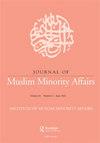作为穆斯林属于魁北克和英属加拿大:受过高等教育的维吾尔族移民的视角
IF 0.4
0 RELIGION
引用次数: 1
摘要
随着“伊斯兰恐惧症”的兴起,西方穆斯林面临着越来越具有挑战性的身份困境。加拿大也不例外。本文结合批判种族理论和后殖民视角,分析了居住在加拿大魁北克省和一些英语省份的13名受过高等教育的维吾尔族穆斯林移民的叙事。他们的故事表明,他们中的许多人已经成为其他穆斯林侨民群体共同的多重身份困境的对象,同时也面临着自己背景特有的一些挑战。这篇文章通过一个新的角度进一步强调了维吾尔人的经历:他们似乎都形成了美国/穆斯林移民与他们/加拿大白人的二分法。在魁北克省,他们的叙述揭示了对占主导地位的魁北克白人的“反对意识”,这是相当政治化的,而在英国省份,他们可能更多地将自己的穆斯林身份视为对白人英国加拿大人的“反对文化”,这要少得多。本文章由计算机程序翻译,如有差异,请以英文原文为准。
Belonging to Quebec and English Canada as Muslims: The Perspectives of the Highly Educated Uyghur Immigrants
Abstract Following the rise of Islamophobia, Muslims in the West have been experiencing increasingly challenging identity dilemmas. Canada is not an exception. This article, at the intersection of Critical Race Theory and post-colonial perspectives, analyzes the narratives of 13 highly educated Uyghur Muslim immigrants living in Quebec and some English provinces of Canada. Their stories show that many of them have become subject to multiple identity dilemmas common to other Muslim diaspora groups, while also facing some challenges unique to their own background. This article further highlights the Uyghur’s experiences through a new angle: they all appear to have developed an us/Muslim immigrant vs. them/white Canadians’ dichotomy. In the province of Quebec, their narratives reveal “oppositional consciousness” against the dominant white Quebecers, which is quite political, while in English provinces they may see their Muslim identity more as “oppositional culture” against the white English Canadians, which is much less political.
求助全文
通过发布文献求助,成功后即可免费获取论文全文。
去求助
来源期刊

Journal of Muslim Minority Affairs
RELIGION-
CiteScore
1.40
自引率
0.00%
发文量
31
期刊介绍:
Journal of Muslim Minority Affairs is a peer reviewed research journal produced by the Institute of Muslim Minority Affairs (IMMA) as part of its publication programme. Published since 1979, the journalhas firmly established itself as a highly respected and widely acclaimed academic and scholarly publication providing accurate, reliable and objective information. Journal of Muslim Minority Affairs provides a forum for frank but responsible discussion of issues relating to the life of Muslims in non-Muslim societies. The journalhas become increasingly influential as the subject of Muslim minorities has acquired added significance. About 500 million Muslims, fully one third of the world Muslim population of 1.5 billion, live as minorities in 149 countries around the globe. Even as minorities they form significant communities within their countries of residence. What kind of life do they live? What are their social, political and economic problems? How do they perceive their strengths and weakness? What above all, is their future in Islam and in the communities of their residence? The journal explores these and similar questions from the Muslim and international point of view in a serious and responsible manner.
 求助内容:
求助内容: 应助结果提醒方式:
应助结果提醒方式:


